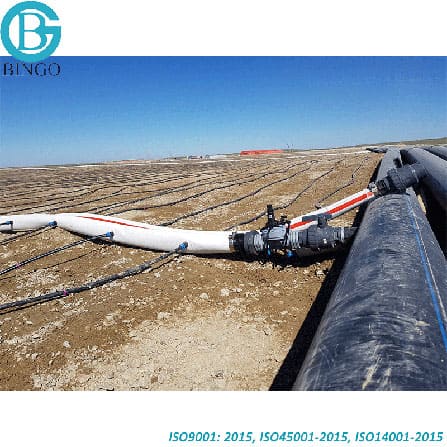Recognizing the Secret Advantages of HDPE Pipe for Water and Wastewater Management
Using HDPE pipe in water and wastewater monitoring presents various benefits that merit factor to consider. Its exceptional longevity and long life-span make it a preferred selection for numerous tasks. Furthermore, the product's resistance to corrosion and chemical damages enhances its dependability in numerous environments. Nonetheless, the advantages expand beyond simply longevity and resistance. Discovering its cost-effectiveness and environmental effect exposes also more compelling factors for its widespread adoption in modern facilities
Phenomenal Durability and Durability

HDPE pipeline stands out for its remarkable sturdiness and durability, making it a favored option in water administration systems. Constructed from high-density polyethylene, these pipes can endure considerable pressure and stress, guaranteeing reputable performance over time. Their robust nature permits them to endure severe ecological problems, including temperature level fluctuations and dirt motions, which can trigger other products to stop working.
The life expectancy of HDPE pipes commonly surpasses 50 years, giving a cost-effective solution for districts and markets alike. Furthermore, the product's lightweight buildings simplify installation, decreasing labor expenses and timeframes. This resilience minimizes the demand for regular repairs or substitutes, even more boosting its economic charm.
In water management applications, the integrity of HDPE pipes suggests fewer disturbances and improved service connection, making them important to sustainable framework development. The mix of sturdiness and longevity solidifies HDPE's duty as a cornerstone in reliable water management options.

Resistance to Corrosion and Chemical Damages
While several products give in to rust and chemical damage in time, HDPE pipelines display amazing resistance, making them suitable for different water monitoring applications. This durability stems from the molecular framework of high-density polyethylene, which is inherently non-reactive and does not rust like metals or degrade from exposure to rough chemicals. As an outcome, HDPE is highly effective in atmospheres with hostile materials, such as wastewater systems that might contain acids, bases, and organic solvents.
In addition, HDPE pipes can withstand ecological factors such as dirt acidity and saline conditions, further improving their viability for diverse applications (Midland TX HDPE Pipe Fittings in Stock). Their capability to maintain structural honesty over time decreases the danger of leaks and failures, which is important in making certain the security and integrity of water circulation and wastewater management systems. The resistance to corrosion and chemical damage considerably contributes to the total effectiveness and longevity of HDPE piping solutions.
Cost-Effectiveness and Economic Advantages
When considering the financial implications of water management systems, the cost-effectiveness of HDPE pipelines ends up being obvious. These pipes provide lower installation and upkeep prices contrasted to standard products like metal or concrete. Their lightweight nature simplifies transport and setup, leading to decreased labor expenses. Additionally, HDPE pipelines show a lengthy life expectancy, usually going beyond half a century, which equates to fewer substitutes and long-term savings.
The resistance of HDPE to content corrosion and chemical damages lessens the need for pricey repair services and replacements. The pipelines likewise support reliable water flow, reducing power costs associated with pumping systems. By alleviating leaks and water loss, HDPE pipelines contribute to significant financial benefits for municipalities and sectors alike. In general, the initial financial investment in HDPE piping can yield significant monetary returns over the life-span of the water administration system, making it a sensible option for lasting facilities growth.
Environmental Sustainability and Lowered Effect

Convenience and Flexibility in Installation
Due to their one-of-a-kind buildings, HDPE pipes use remarkable adaptability and adaptability in installation, making them appropriate for a variety of applications. Their lightweight nature permits much easier handling and transport, reducing labor expenses and setup time. HDPE pipelines can be bent and shaped to fit different surfaces and task requirements, which is particularly helpful in testing settings.
Additionally, their resistance to corrosion and chemical damage enables installation in diverse settings without the need for specialized protective finishings. The capacity to fuse joints develops a continual, leak-free system, boosting the total integrity and reliability of the installation. HDPE's flexibility also accommodates ground movement, reducing the risk of damage in areas prone to changing dirt. On the whole, these characteristics make HDPE pipes not just functional yet also a recommended option for water and wastewater administration systems.
Frequently Asked Inquiries
Just How Does HDPE Pipeline Contrast to PVC in Water Monitoring Applications?
HDPE pipeline supplies premium versatility, resistance to rust, and toughness my link compared to PVC. Its lighter weight helps with easier installation, while its long lifespan lowers substitute expenses, making HDPE a preferred selection in water administration applications.
What Is the Life Expectancy of HDPE Pipeline Under Typical Problems?
Under typical conditions, HDPE pipelines can have a life expectancy varying from 50 to 100 years. Their longevity and resistance to corrosion add to their lasting performance in various applications, making them a reputable choice for framework.
Are HDPE Water Lines Recyclable After Their Service Life?
Yes, HDPE pipelines are recyclable after their service life. Pipe Manufacturing Midland TX. They can be refined and repurposed into brand-new items, considerably reducing ecological influence and promoting sustainability within the sector, making them an eco-friendly selection for piping solutions
What Is the Installment Refine for HDPE Pipeline?
The installment process for HDPE pipes includes website preparation, trenching, pipeline fusion or mechanical joining, backfilling, and stress screening. Proper methods assure a long lasting and efficient system for carrying water and wastewater effectively.
Can HDPE Pipeline Be Used for Both Potable and Non-Potable Water Solutions?
Yes, HDPE pipelines can be used for both potable and non-potable water systems. Their convenience, toughness, and resistance to corrosion make them suitable for different applications, making sure secure and reliable transportation of water in various contexts.